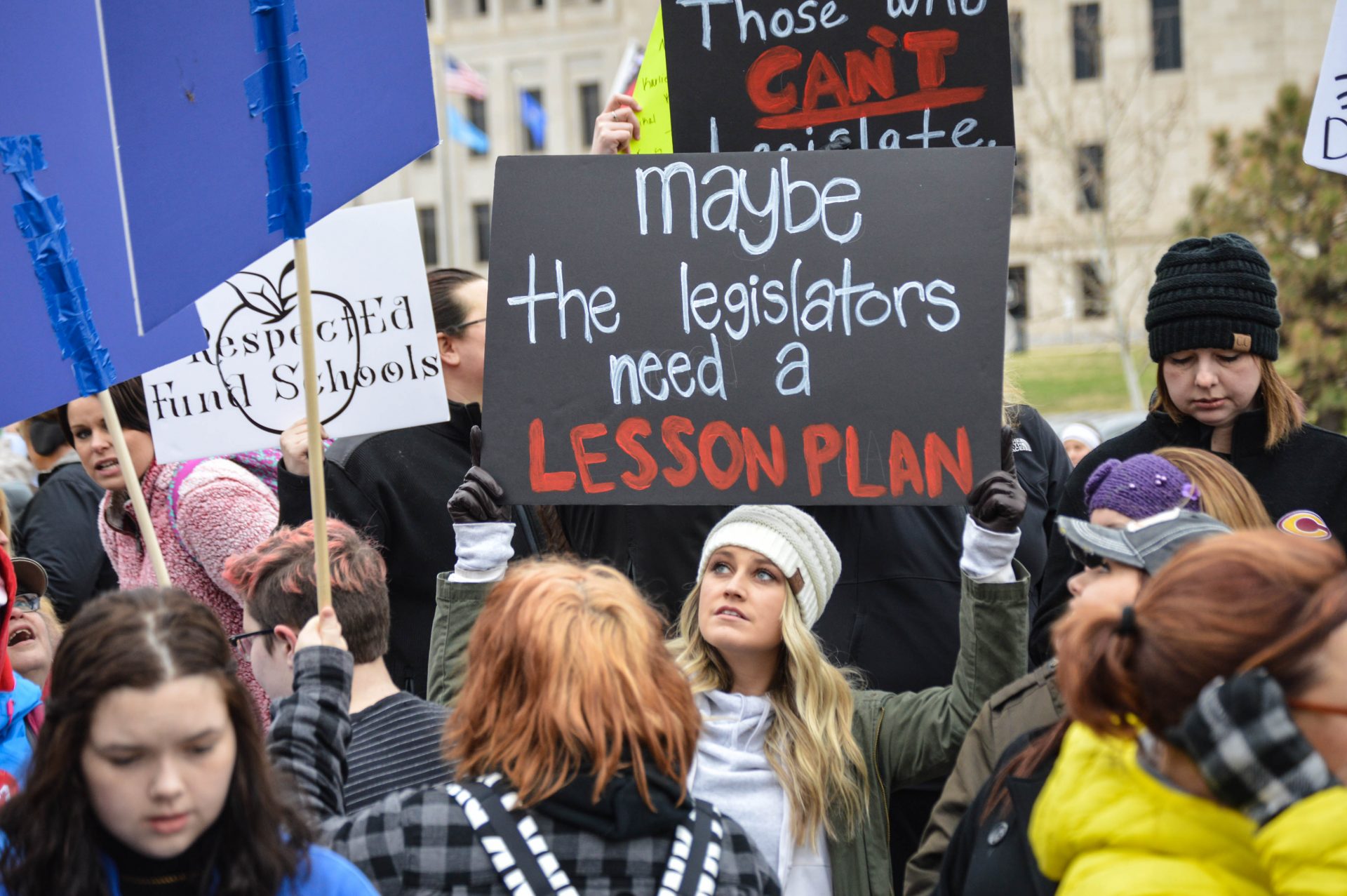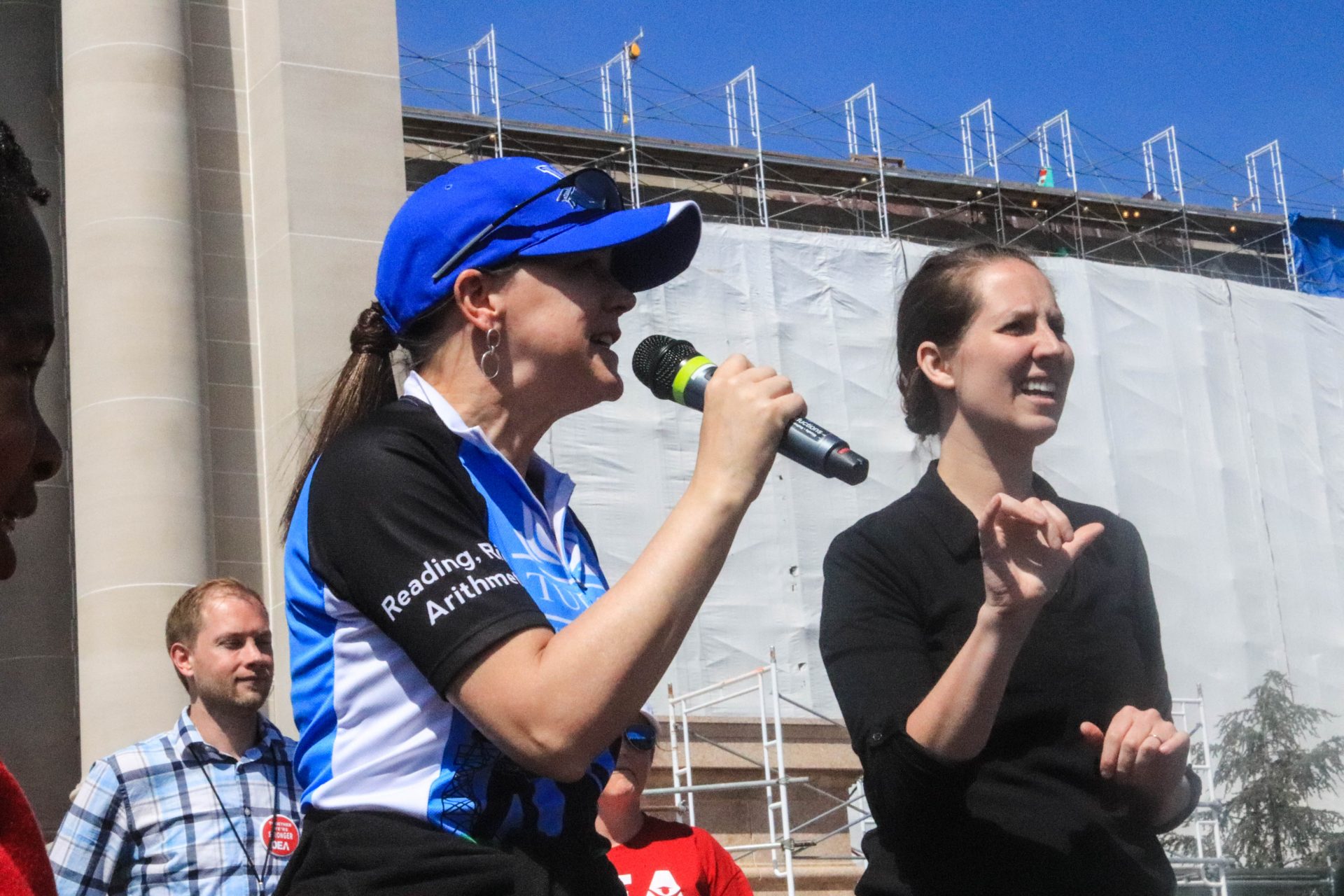
Teachers rally at the state capitol during the 2018 teacher walkout.
Jacob McCleland / KGOU


Teachers rally at the state capitol during the 2018 teacher walkout.
Jacob McCleland / KGOU

Emily Wendler / StateImpact Oklahoma
Tulsa Public School Superintendent Deborah Gist speaks to a crowd of supporters during the Oklahoma teacher walkout.
Deborah Gist cried as she stepped across the small stage in front the Oklahoma State Capitol. The Superintendent of Tulsa Public Schools and a group of educators had just finished a 110-mile walk from Tulsa to Oklahoma City to highlight their fight for more school funding.
It was the seventh day of Oklahoma’s teacher walkout, and thousands of supporters rallied to greet the group as it finished the final mile.
“This is not a rally,” Gist yelled to the crowd. “This is not a protest. This is a movement!”
Gist’s tears soon gave way to an energetic speech in which she challenged teachers to continue fighting for schools after the walkout ended. One way to do that, she said, was direct involvement in state politics.
“We must vote!” she said. “We must register others to vote! We must run for office!”
Candidate filing for state offices started the next day. By the end of the week, a record 794 Oklahomans decided to run. Some estimates suggest as many as 80 of those campaigners are public school teachers.
Cody Coonce, an English teacher at Bixby High School, is one of them. He says it was his lawmakers’ reluctance to meet with educators during the strike that made him think he could do better.
“I tried to meet with a few lawmakers, who, three days in a row, could not be found,” he said. “It was just impossible to sit down and talk over issues, and I feel like it’s important, even if I completely disagree with another person, to give them the time to make their case.”
Coonce, a Republican, is running to unseat Republican Rep. Mike Ritze. Coonce says he wants to make school funding a priority and feels the long-time incumbent has not.
“I believe that if I had a candidate who was pro-education in my district, I would not have felt the need to run as much as I did,” Coonce said.
Jen Youngberg teaches in Haskell Public Schools, a small district southeast of Tulsa. She’s filed as a Democratic opponent to Ritze and describes a similar experience during the teacher walkout.
“After having the opportunity to meet my representatives at the Capitol, I was extremely upset by their nonchalance of what to do about the education crisis in Oklahoma,” she said.
Another educator, Democrat Madeline Scott, is vying for Republican Rep. Tess Teague’s seat in Choctaw. Scott said she planned to run in 2020, but the teacher walkout motivated her to enter politics sooner, rather than later.
“I spoke to my representatives, and it felt like they didn’t hear me,” she said. “I was invisible. I didn’t matter.”
All three teachers say the lawmakers representing their local districts are out of touch. The candidates’ school boards all voted unanimously to support teachers who walked out to pressure lawmakers for teacher raises and more school funding.
Both Ritze and Teague voted against three major legislative packages that would have increased taxes to fund teacher pay raises.
Neither incumbent responded to StateImpact’s request for comment. In other interviews, Ritze took issue with businesses exempted from an increase on tobacco taxes. Teague wrote on Facebook she thinks lawmakers could have increased school funding without raising taxes.

Jacob McCleland / KGOU
Teachers and supporters rally at the state capitol during the nine-day teacher walkout.
Deven Carlson, an education policy researcher at the University of Oklahoma, says many of the state’s most conservative Republicans will have to fight the hardest to keep their seats during the 2018 election.
“Those representatives who opposed most of the revenue measures brought forth in the House this Spring are seeing a significant[ly] larger number of challengers than those who were generally supportive of the revenue measures,” he said.
Ritze, for example, ran unopposed in 2014, but now has five contenders. Teague, for her part, drew seven opponents.
The fierce political competition isn’t reserved for only tax-wary conservatives though. In the House alone, the number of candidates has nearly doubled since 2014.
Another way of looking at it: Fifty-one House members ran unopposed in 2014. For the 2018 election, only 15 are unopposed — and most of them are Democrats.
Andy Richardson is a lawyer running against Rep. Chuck Strohm for House District 69, another crowded race in the Tulsa area. Richardson says it’s clear that Oklahoma voters want change.
“I saw the way that the educators, teachers, friends descended on the Capitol, and there just seems to be a disconnect between the Legislature and what Oklahomans really want,” he said.
Richardson’s read on his community is that people want stronger, better-funded public schools.
It’s unclear whether the momentum from the teacher walkout will fuel significant change this election season. In 2016, a similar thing happened: About 40 teachers ran for office on a platform of increased school funding. Only five of them won.